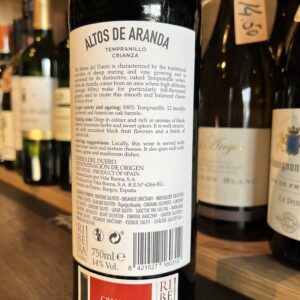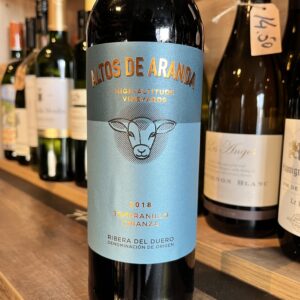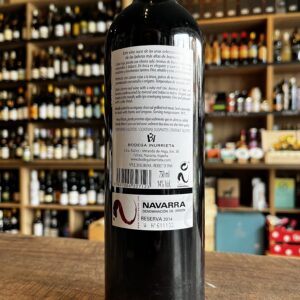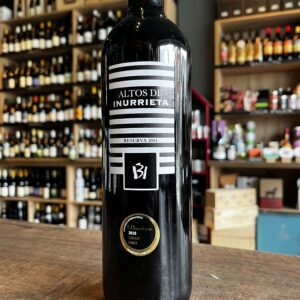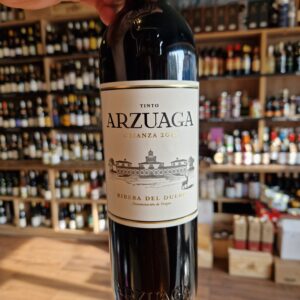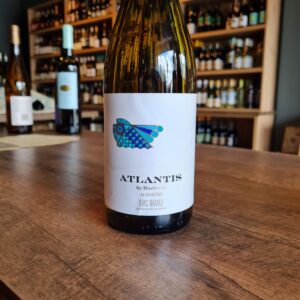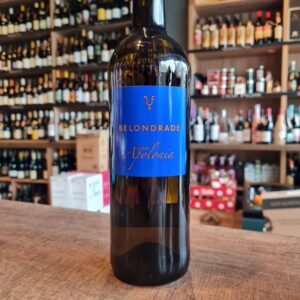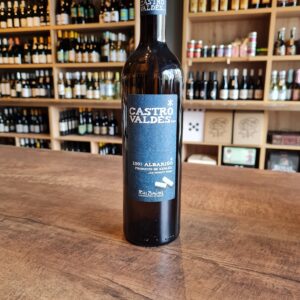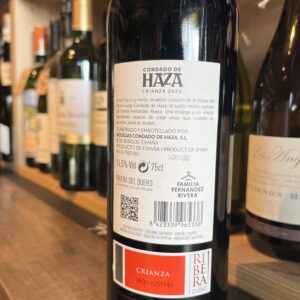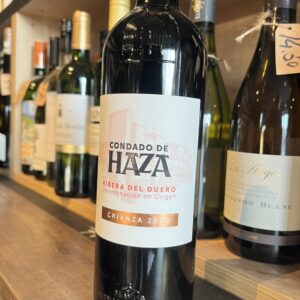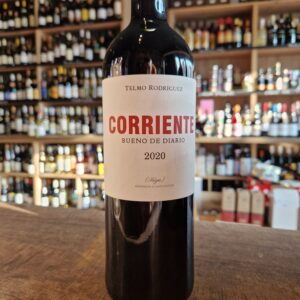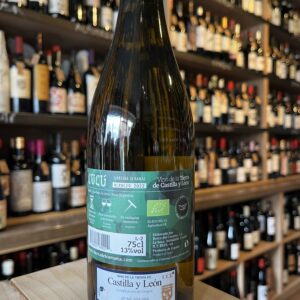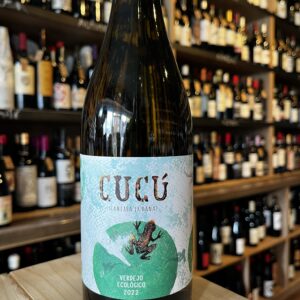Spain
The Spanish wine scene is incredibly diverse and an immense number of different wines are made in the country. You have the red wines (Vinos tintos),different styles of white wines (Vinos blancos) and sparkling wines (Cavas or Espumosos). The wines from each region are highly intertwined with the cultures of their respective regions. Each wine reflects its region’s climate, geography, history and cuisine of course. Spain in the last 10 years is going through a sort of wine renaissance, where winemakers are reviving old vines and exploring their regions and the uniqueness of each, passing that to the flavour profile of the wine. If you have a inclination for white wines, you will find that Rias Baixas Albariño or a Rueda’s Verdejo, or perhaps a Godello will catch your attention. On the reds, Tempranillo comes to mind from La Rioja or even Ribera Del Duero. But let’s not forget the Garnacha’s from Priorat, the monastrell from Murcia, the Bobal from Valencia. The list is endless… I can assure while Rioja wines are still great, the rest of Spain has caught up to them.
More about Spain
-
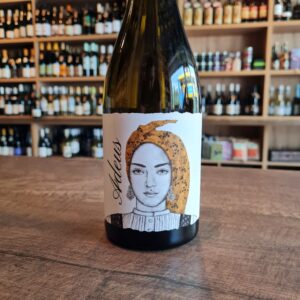 Adeus is the same in Galician as it is Portuguese and means ''Goodbye''. It is also the title of a Galician poem done by one of the most famous poets of Galicia, Rosalia de Castro. One worth that stays in between the love for her land and a homage to a woman that means so much for the history of Galicia. The Ribeiro is 45 km inland from the Atlantic Ocean and is situated in the middle of Valleys that protects it from the Atlantic winds. With 3 Rivers crossing has excellent conditions to produce wine. An excellent pair to grilled octopus with white asparagus garnish, monkfish fillet with stewed spinach and shrimps in garlic sauce
Adeus is the same in Galician as it is Portuguese and means ''Goodbye''. It is also the title of a Galician poem done by one of the most famous poets of Galicia, Rosalia de Castro. One worth that stays in between the love for her land and a homage to a woman that means so much for the history of Galicia. The Ribeiro is 45 km inland from the Atlantic Ocean and is situated in the middle of Valleys that protects it from the Atlantic winds. With 3 Rivers crossing has excellent conditions to produce wine. An excellent pair to grilled octopus with white asparagus garnish, monkfish fillet with stewed spinach and shrimps in garlic sauce -
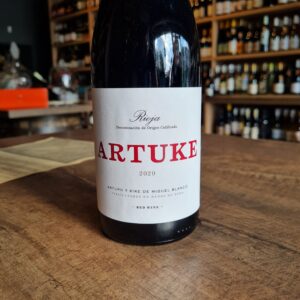 Made in a Beaujolais style, with the carbonic maceration method. This juicy ''Joven'' fresh fruited style of Rioja has zero oak influence as it ages in concrete tanks for 6 months. Farmed without any synthetic fertilizers or pesticides. Arturo Blanco was once asked what the philosophy at Bodegas Artuke was and he simply replied 'we are farmers'. The approach here is 100% focused on interpreting the family's 32 plots which are split between the villages of Baños de Ebro and Ábalos in Rioja Alavesa. Biodynamic techniques are employed in the vineyards and Arturo and Kike are also busy recovering old, ignored plots of ancient vines. Vinification is aimed at expressing the characteristics of the vineyard and quality of fruit above all else. The restrained use of oak and inclination towards different types/sizes of barrel, plus an unwillingness to adhere to the subscribed regimes for classification means that Artuke are precluded from using Crianza, Reserva and Gran Reserva designations on their wines. This mouth-watering red wine takes a relatively deep chill which makes it a versatile pairing with all types of food: tuna, pretty much anything made with zucchini, fried chicken, gooey cheese sandwiches, pizza, etc…
Made in a Beaujolais style, with the carbonic maceration method. This juicy ''Joven'' fresh fruited style of Rioja has zero oak influence as it ages in concrete tanks for 6 months. Farmed without any synthetic fertilizers or pesticides. Arturo Blanco was once asked what the philosophy at Bodegas Artuke was and he simply replied 'we are farmers'. The approach here is 100% focused on interpreting the family's 32 plots which are split between the villages of Baños de Ebro and Ábalos in Rioja Alavesa. Biodynamic techniques are employed in the vineyards and Arturo and Kike are also busy recovering old, ignored plots of ancient vines. Vinification is aimed at expressing the characteristics of the vineyard and quality of fruit above all else. The restrained use of oak and inclination towards different types/sizes of barrel, plus an unwillingness to adhere to the subscribed regimes for classification means that Artuke are precluded from using Crianza, Reserva and Gran Reserva designations on their wines. This mouth-watering red wine takes a relatively deep chill which makes it a versatile pairing with all types of food: tuna, pretty much anything made with zucchini, fried chicken, gooey cheese sandwiches, pizza, etc… -
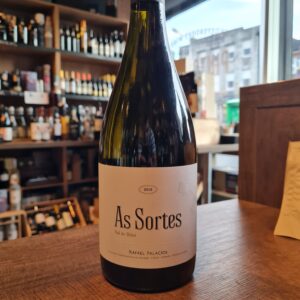 Rafael Palacios is the son of D. José Palacios Remondo (founder of Bodegas Palacios Remondo) and the brother of Alvaro Palacios(Priorat) but ultimately a passionate producer of white wine. After producing his first white at the family-run winery, called Plácet, he decided to set up his own winery in Galicia, in the Valle del Bibei, under the Valdeorras denomination. Established in 2004, Rafael Palacios has rapidly become one of Spain’s greatest producers of white wine. His focus is on the local variety Godello, grown in a small estate on very old vines that are up to 90 years old from the areas steep-sided, terraced vineyards and have been cultivated with respect of the land, without using any type of herbicide or pesticide. Rafael Palacios is refining his work year after year, reaching the magic of the greatest wines. A top wine, and one to keep. Grub pairing suggestions are mild Asian dishes, Moroccan specialities, fish ragout with saffron sauce Risotto ai frutti di mar
Rafael Palacios is the son of D. José Palacios Remondo (founder of Bodegas Palacios Remondo) and the brother of Alvaro Palacios(Priorat) but ultimately a passionate producer of white wine. After producing his first white at the family-run winery, called Plácet, he decided to set up his own winery in Galicia, in the Valle del Bibei, under the Valdeorras denomination. Established in 2004, Rafael Palacios has rapidly become one of Spain’s greatest producers of white wine. His focus is on the local variety Godello, grown in a small estate on very old vines that are up to 90 years old from the areas steep-sided, terraced vineyards and have been cultivated with respect of the land, without using any type of herbicide or pesticide. Rafael Palacios is refining his work year after year, reaching the magic of the greatest wines. A top wine, and one to keep. Grub pairing suggestions are mild Asian dishes, Moroccan specialities, fish ragout with saffron sauce Risotto ai frutti di mar -
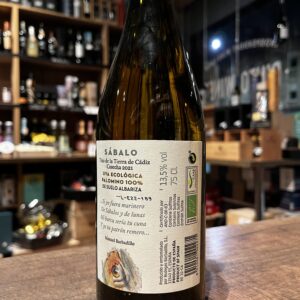
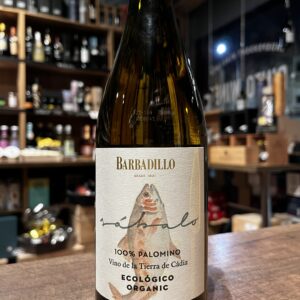 Sábalo is produced from 100% ecological Palomino Fino grapes and it is a spectacular wine, the true fruit of our many years of expertise. The grapes used to produce this wine are harvested in the white albariza soils of Sanlúcar, and as such the sea, the marshlands and the Guadalquivir River all form part of what is essentially Sábalo’s DNA.
Sábalo is produced from 100% ecological Palomino Fino grapes and it is a spectacular wine, the true fruit of our many years of expertise. The grapes used to produce this wine are harvested in the white albariza soils of Sanlúcar, and as such the sea, the marshlands and the Guadalquivir River all form part of what is essentially Sábalo’s DNA. -
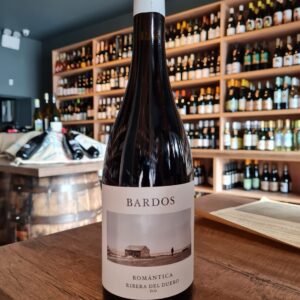 Bardos Romantica is a red wine from Ribera del Duero, produced by Bodegas Bardos, belonging to the Vintae Group, which are known to produce wines in twelve different Spanish regions, such as the Hacienda López from Haro. Made from 100% Tinta del País (Tempranillo). The grapes come from a rigorous selection of low yielding old vines located in the highlands of the central plateau in Onesimus Quintanilla (Valladolid). The grapes, once collected, are transported to the winery in boxes of 15 kilos and small trailers. Here a selection of bunches is made on tables. Subsequent fermentation and maceration is carried out in vats at a temperature of 28ªC for 3 or 4 weeks. Once fermented and macerated, Bardos Romantica undergoes a malolactic fermentation in French oak barrels, with a weekly beating and strict control of each barrel. Finally, Bardos Romantica is aged for 14 months in barrels of one and two years in French oak, located in underground cellars where the temperature is maintained throughout the year at around 14ºC. Bardos Romantica is a soft and original wine. After all the technicalities all I can say is a great wine, enjoy it, share it!
Bardos Romantica is a red wine from Ribera del Duero, produced by Bodegas Bardos, belonging to the Vintae Group, which are known to produce wines in twelve different Spanish regions, such as the Hacienda López from Haro. Made from 100% Tinta del País (Tempranillo). The grapes come from a rigorous selection of low yielding old vines located in the highlands of the central plateau in Onesimus Quintanilla (Valladolid). The grapes, once collected, are transported to the winery in boxes of 15 kilos and small trailers. Here a selection of bunches is made on tables. Subsequent fermentation and maceration is carried out in vats at a temperature of 28ªC for 3 or 4 weeks. Once fermented and macerated, Bardos Romantica undergoes a malolactic fermentation in French oak barrels, with a weekly beating and strict control of each barrel. Finally, Bardos Romantica is aged for 14 months in barrels of one and two years in French oak, located in underground cellars where the temperature is maintained throughout the year at around 14ºC. Bardos Romantica is a soft and original wine. After all the technicalities all I can say is a great wine, enjoy it, share it! -
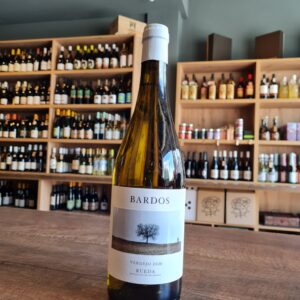 Bardos Verdejo is a wine made from 100% Verdejo from vineyards that are 20-25 years old, located in Rueda, at more than 700 metres of altitude on stony soils. The harvest is carried out at night, at temperatures below 15ºC. The fermentation is done with local yeasts at a controlled temperature and the wine rests on its lees for at least 4 months, gaining complexity and texture. On the nose, the intense aromas of fruit such as white peach combine with cut grass, citrus, balsamic and mineral notes. In the mouth it has a good volume and persistence, well integrated acidity and a characteristic aniseed aftertaste, typical of the grape. Really a high quality example of this native Spanish variety. Excellent with light bites, starters, salads and white fish. All of the wines by De Bardos are crafted by hand in a fully artisan manner.
Bardos Verdejo is a wine made from 100% Verdejo from vineyards that are 20-25 years old, located in Rueda, at more than 700 metres of altitude on stony soils. The harvest is carried out at night, at temperatures below 15ºC. The fermentation is done with local yeasts at a controlled temperature and the wine rests on its lees for at least 4 months, gaining complexity and texture. On the nose, the intense aromas of fruit such as white peach combine with cut grass, citrus, balsamic and mineral notes. In the mouth it has a good volume and persistence, well integrated acidity and a characteristic aniseed aftertaste, typical of the grape. Really a high quality example of this native Spanish variety. Excellent with light bites, starters, salads and white fish. All of the wines by De Bardos are crafted by hand in a fully artisan manner. -
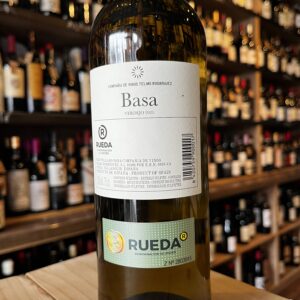
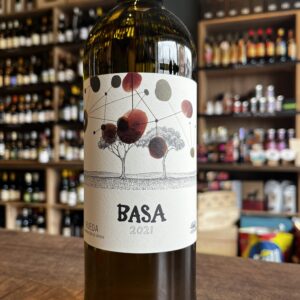 Telmo Rodriguez of Basque origin, studied wine at the Institute of Oenology in Bordeaux, before doing internships with Cos d’Estournel, Jean Louis Chave and Trevallon . He also worked in the vinification of wines from the family estate of Remelluri, in Rioja. Then, in 1990, with an investment of just a few thousand euros, he launched his own winery. He buys grapes to produce his first wines. His first plots of property did not arrive until 1997, in Rioja. Paradoxical for someone who was dying to explore new regions. One of the main principles of Telmo Rodriguez is that of respecting the Spanish tradition of cultivating the vine in goblet, because this method of managing the vine protects it from the great heat of Iberian vineyards. He is fiercely opposed to the fashion of trellising vineyards and only buys vines that respect his ideal. Telmo also works in biodynamics but, showing great common sense, he admits that he only does it for the respect of the land and that the mention of organic viticulture has no importance in his eyes. The important thing is that the result is a balanced and tasty wine. The name comes from the 40-year-old 'baso' or bush-trained vines that are planted on limestone-rich soils at over 700-meters elevation on a plateau along the Duero River. Soils are made of gravel from fluvial terraces, erosion slopes and glacis. Pairs great with comfort food, Tapas and Tortillas of all sorts
Telmo Rodriguez of Basque origin, studied wine at the Institute of Oenology in Bordeaux, before doing internships with Cos d’Estournel, Jean Louis Chave and Trevallon . He also worked in the vinification of wines from the family estate of Remelluri, in Rioja. Then, in 1990, with an investment of just a few thousand euros, he launched his own winery. He buys grapes to produce his first wines. His first plots of property did not arrive until 1997, in Rioja. Paradoxical for someone who was dying to explore new regions. One of the main principles of Telmo Rodriguez is that of respecting the Spanish tradition of cultivating the vine in goblet, because this method of managing the vine protects it from the great heat of Iberian vineyards. He is fiercely opposed to the fashion of trellising vineyards and only buys vines that respect his ideal. Telmo also works in biodynamics but, showing great common sense, he admits that he only does it for the respect of the land and that the mention of organic viticulture has no importance in his eyes. The important thing is that the result is a balanced and tasty wine. The name comes from the 40-year-old 'baso' or bush-trained vines that are planted on limestone-rich soils at over 700-meters elevation on a plateau along the Duero River. Soils are made of gravel from fluvial terraces, erosion slopes and glacis. Pairs great with comfort food, Tapas and Tortillas of all sorts -
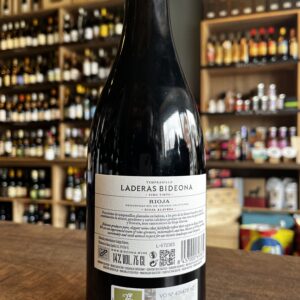
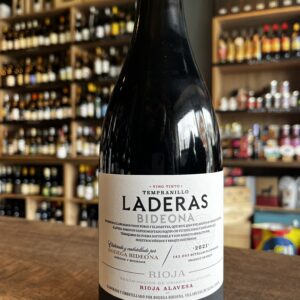 Badiola is a winery in the heart of Rioja Alavesa. Founded in 2018 by acquiring an existing winery, Badiola offers village and single vieyard wines that display the freshness, elegance and depth of flavours which distinguish the great wines from this part of Rioja. Badiola cultivates over 300 parcels of extraordinary vineyards on the slopes of the Sierra Cantabria, mainly in the villages of villabuena de Alava, Leza, Samaniego, Laguardia, Navaridas and Banos de Ebro. Averag age of the vines are 50 years old which means that fruit is of outstanding quality and well the vine is well inserted into the soil and not as prone to climatic issues that may arise. This wine is made from high quality, low yelding grapes from hillside(Laderas) vines on limestones soils, without the need for carbonic maceration to mask unripe or unhealthy fruit. About a quarter of the wine is aged from 4 to 6 months in new barriques of top quality French and American Oak, for added complexity and texture, but not overt oak character. A versatile and very satisfying drinking wine and a great example of cooler climate Tempranillo from Rioja Alavesa. A good match with both meat and fish-based tapas, mezze, rice dishes and pasta.
Badiola is a winery in the heart of Rioja Alavesa. Founded in 2018 by acquiring an existing winery, Badiola offers village and single vieyard wines that display the freshness, elegance and depth of flavours which distinguish the great wines from this part of Rioja. Badiola cultivates over 300 parcels of extraordinary vineyards on the slopes of the Sierra Cantabria, mainly in the villages of villabuena de Alava, Leza, Samaniego, Laguardia, Navaridas and Banos de Ebro. Averag age of the vines are 50 years old which means that fruit is of outstanding quality and well the vine is well inserted into the soil and not as prone to climatic issues that may arise. This wine is made from high quality, low yelding grapes from hillside(Laderas) vines on limestones soils, without the need for carbonic maceration to mask unripe or unhealthy fruit. About a quarter of the wine is aged from 4 to 6 months in new barriques of top quality French and American Oak, for added complexity and texture, but not overt oak character. A versatile and very satisfying drinking wine and a great example of cooler climate Tempranillo from Rioja Alavesa. A good match with both meat and fish-based tapas, mezze, rice dishes and pasta. -
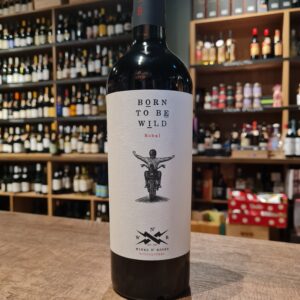 Mars Bonfire, Steppenwolf’s drummer’s brother, saw a poster which said,” Born To Ride” with a photo of a motorbike taking off from the ground surrounded by fire. Around that time, he had bought his first car and that’s how the idea came about to celebrate the freedom of being able to go where you want and when you want. NASA used “Born To Be Wild” to wake up their astronaut crews. And when a spaceship landed for the first time on Mars the small exploratory vehicle went down the ramp to the rhythm of “Get your motor running”. In 2004 Paris Hilton asked permission to use the song in her reality show The Simple Life. The band refused.” There are things Rock’n’Roll can’t accept.” The organic Bobal grapes are grown in poor clay soils situated in the west of the province of Valencia at 700 metres altitude. The vines grow in a ‘continental’ climate influenced by the Mediterranean. The wine spends 9 months in French and American oak barrels. Best enjoyed relaxing and/or with pasta, rice and red meat dishes. The Bobal grape variety has really high levels of resveratrol, an antioxidant and a heart healthy polyphenol, which helps metabolise fats.
Mars Bonfire, Steppenwolf’s drummer’s brother, saw a poster which said,” Born To Ride” with a photo of a motorbike taking off from the ground surrounded by fire. Around that time, he had bought his first car and that’s how the idea came about to celebrate the freedom of being able to go where you want and when you want. NASA used “Born To Be Wild” to wake up their astronaut crews. And when a spaceship landed for the first time on Mars the small exploratory vehicle went down the ramp to the rhythm of “Get your motor running”. In 2004 Paris Hilton asked permission to use the song in her reality show The Simple Life. The band refused.” There are things Rock’n’Roll can’t accept.” The organic Bobal grapes are grown in poor clay soils situated in the west of the province of Valencia at 700 metres altitude. The vines grow in a ‘continental’ climate influenced by the Mediterranean. The wine spends 9 months in French and American oak barrels. Best enjoyed relaxing and/or with pasta, rice and red meat dishes. The Bobal grape variety has really high levels of resveratrol, an antioxidant and a heart healthy polyphenol, which helps metabolise fats. -
Out of stock
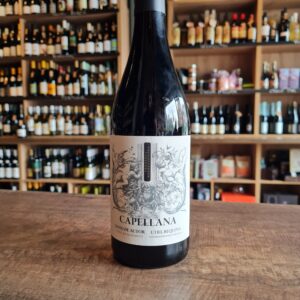 This complex and medium to full-bodied wine is made from Cabernet Sauvignon and Tempranillo grapes. It matured for 7 months in American oak barrels to its full taste. The Cabernet brings strength and abundance here, Tempranillo provides fruit and structure. The result is a wine with character and personality. Cherry juice-colored to brick-red in the glass. Overwhelming scent of cherries, plums and wild berries; the same fruits pickled in rum, all nobly underlaid with fine toasted notes from the wooden barrel. The oak wood is noticeable, but does not dominate the wine. In the mouth the wine is well structured, full and with little surprising tannins. Ideal to accompany grilled meats and different types of stews.
This complex and medium to full-bodied wine is made from Cabernet Sauvignon and Tempranillo grapes. It matured for 7 months in American oak barrels to its full taste. The Cabernet brings strength and abundance here, Tempranillo provides fruit and structure. The result is a wine with character and personality. Cherry juice-colored to brick-red in the glass. Overwhelming scent of cherries, plums and wild berries; the same fruits pickled in rum, all nobly underlaid with fine toasted notes from the wooden barrel. The oak wood is noticeable, but does not dominate the wine. In the mouth the wine is well structured, full and with little surprising tannins. Ideal to accompany grilled meats and different types of stews. -
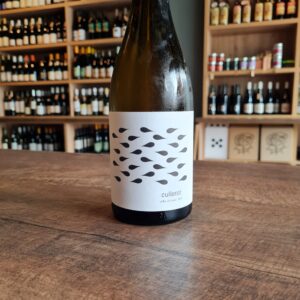 Celler del Roure is making very interesting wines with local grape varieties in the Valencia area. Many of these old, indigenous varieties are largely forgotten and Cullerot highlights three of them (Verdil, Tortosina, and Merseguera) together with Pedro Ximénez, Macabeo, Malvasía, and others. In addition to their focus on indigenous grape varieties, Celler del Roure is employing traditional vinifications methods: hand harvesting, fermenting with native yeasts in stone lagars, and aging in very old clay amphorae. Cullerot has a bit of skin contact, and is medium bodied with notes of stone fruit, tropical notes, apple skin, and clay-y minerality. A great, truly interesting, "almost-orange" skin contact white wine, for less than €20.
Celler del Roure is making very interesting wines with local grape varieties in the Valencia area. Many of these old, indigenous varieties are largely forgotten and Cullerot highlights three of them (Verdil, Tortosina, and Merseguera) together with Pedro Ximénez, Macabeo, Malvasía, and others. In addition to their focus on indigenous grape varieties, Celler del Roure is employing traditional vinifications methods: hand harvesting, fermenting with native yeasts in stone lagars, and aging in very old clay amphorae. Cullerot has a bit of skin contact, and is medium bodied with notes of stone fruit, tropical notes, apple skin, and clay-y minerality. A great, truly interesting, "almost-orange" skin contact white wine, for less than €20. -
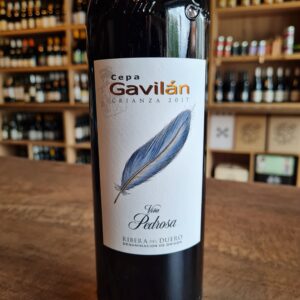 This is a wine with great intensity of character. It has an immediate spice dominated nose with clove and baked vanilla pod alongside of spicy red fruit flavours. It warms up to give a slight balsamic note with boysenberry jam and blackberry puree. The palate is textural with medium, yet soft, tannins which helps to keep it all together. A surprising amount of class and concentration for this price point.Just don't forget to decant it or let it breath before hand, or not. Enjoy!
This is a wine with great intensity of character. It has an immediate spice dominated nose with clove and baked vanilla pod alongside of spicy red fruit flavours. It warms up to give a slight balsamic note with boysenberry jam and blackberry puree. The palate is textural with medium, yet soft, tannins which helps to keep it all together. A surprising amount of class and concentration for this price point.Just don't forget to decant it or let it breath before hand, or not. Enjoy! -
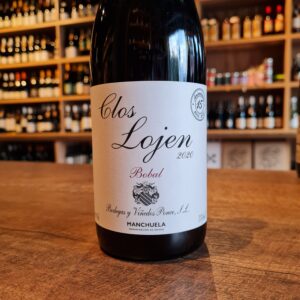 Manchuela is the spiritual home of the Bobal grape. Clos Lojen made by Bodega y Viñedos Ponce is a biodynamic and pure 100% Bobal from limestone soils, fermented in big oak casks. Bobal is the 2nd most planted red variety in Spain yet so little of it reaches the heights of which it’s undoubtedly capable. With a naturally deep colour, high levels of tannins, high acidity and an ability to be exciting as either a blending partner or a mono-varietal wine, momentum needs to be gained with Bobal, till then we seek winemakers that do exciting things and produce wines that are fun to drink. As per Juan Antonio Ponce own words “I want my wines to be bought by any ordinary person. We must be able to reach consumers in a straight-forward manner otherwise beer will cannibalize our markets.”
Manchuela is the spiritual home of the Bobal grape. Clos Lojen made by Bodega y Viñedos Ponce is a biodynamic and pure 100% Bobal from limestone soils, fermented in big oak casks. Bobal is the 2nd most planted red variety in Spain yet so little of it reaches the heights of which it’s undoubtedly capable. With a naturally deep colour, high levels of tannins, high acidity and an ability to be exciting as either a blending partner or a mono-varietal wine, momentum needs to be gained with Bobal, till then we seek winemakers that do exciting things and produce wines that are fun to drink. As per Juan Antonio Ponce own words “I want my wines to be bought by any ordinary person. We must be able to reach consumers in a straight-forward manner otherwise beer will cannibalize our markets.” -
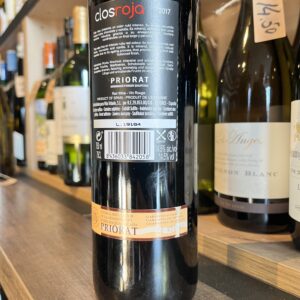
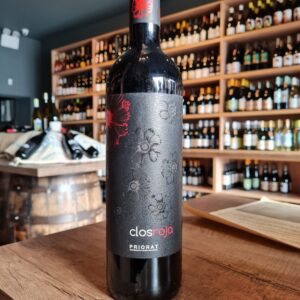 This is one of our favourite wine-finds of late! Priorat, a wine region in northeastern Spain, is known for stunning, terraced vineyards and robust red blends that often fetch a pretty penny. An old vine blend of Grenache, Carignan, Syrah, Cabernet and Merlot finished in French and American oak barrels. Notes of red cherry, chocolate define this silky & balanced wine! Lovely with Red meats, blue cheese or Chocolate.
This is one of our favourite wine-finds of late! Priorat, a wine region in northeastern Spain, is known for stunning, terraced vineyards and robust red blends that often fetch a pretty penny. An old vine blend of Grenache, Carignan, Syrah, Cabernet and Merlot finished in French and American oak barrels. Notes of red cherry, chocolate define this silky & balanced wine! Lovely with Red meats, blue cheese or Chocolate. -
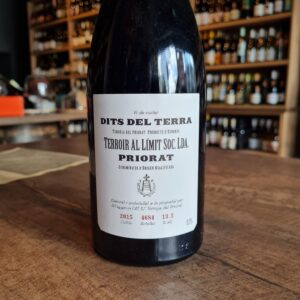 The wine Priorat Dits del Terra is a red wine produced in the Catalunya region, more precisely Priorat or the Torroja del Priorat in Spain, by Terroir al Limit. The vineyards are south facing in the sun-baked slate hills of Priorat and 60+ year old carignan vines are not usually harbingers of floral elegance and silken grace. And yet this gap between expectation and stunning creation is precisely what makes Dits de Terra so iconic. The vineyard, one of the original Terroir Al Limit holdings, honors the Cyprus trees that shade the historic Eremitas throughout the region. It is crafted using whole bunch fermentation and initial vinification in cement, then afforded a rare gift: time, in the form of 16 months in Stockinger foudres and cement, with a gentle and unobtrusive elevage. This care and attention elevates it into a fine, complex and fluid expression of different terroirs. The dark depths in the glass belie its ephemeral lightness in aroma and flavor. Breathy black fruits and a persistent herbality enhance the supple spice and suspended movement across the palate. Anise, fresh fennel and rose notes are underscored with a fluid web of balsamic accents - never weighty nor wide. The wine exudes gravitas with the elegant confidence that comes only from complete comfort in one’s own skin. Only 2000 bottles produced, Masterclass of a wine!
The wine Priorat Dits del Terra is a red wine produced in the Catalunya region, more precisely Priorat or the Torroja del Priorat in Spain, by Terroir al Limit. The vineyards are south facing in the sun-baked slate hills of Priorat and 60+ year old carignan vines are not usually harbingers of floral elegance and silken grace. And yet this gap between expectation and stunning creation is precisely what makes Dits de Terra so iconic. The vineyard, one of the original Terroir Al Limit holdings, honors the Cyprus trees that shade the historic Eremitas throughout the region. It is crafted using whole bunch fermentation and initial vinification in cement, then afforded a rare gift: time, in the form of 16 months in Stockinger foudres and cement, with a gentle and unobtrusive elevage. This care and attention elevates it into a fine, complex and fluid expression of different terroirs. The dark depths in the glass belie its ephemeral lightness in aroma and flavor. Breathy black fruits and a persistent herbality enhance the supple spice and suspended movement across the palate. Anise, fresh fennel and rose notes are underscored with a fluid web of balsamic accents - never weighty nor wide. The wine exudes gravitas with the elegant confidence that comes only from complete comfort in one’s own skin. Only 2000 bottles produced, Masterclass of a wine!


